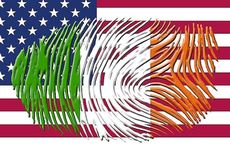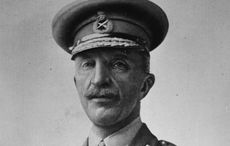Never offend an Irish family. Our memories are too long and vindictive.
Italians are noted for the enduring force of their vendettas, but I believe ours come close. My brother Sean, the most dogmatic of the clan, put on his collar and tie in Dublin and recently headed off to the National Museum in Kildare Street for the 75th anniversary commemorative lecture honoring the founding of the Irish Folklore Commission.
It was delivered by the very distinguished folklorist Professor Henry Glassie. Sean would have loved to stand up on his hind legs and powerfully state what I am stating here. Moral of the story is to never offend an Irish family.
You see, what happened was that when we were growing up in Belnaleck in Fermanagh our lovely father Sandy, at the end of his day in our country shop, would constantly be filling out questionnaires and documents for the Folklore Commission in Dublin. You ran the risk of being called upon as the penman when his arthritic hands got tired.
Sandy was always interested in folklore and collected infinite scraps of it from his customers and neighbors. And he wrote it all down and sent it to Kevin Danaher in the Folklore Commission in Dublin.
It is a fact that our little shop and the attached dwelling house was the social center of the parish, certainly for the Catholic population. The hearth was always surrounded by visitors.
We had what was called a Ceiliing House (kay-lee-ing) with all welcome for a chat and the music and song. And the folklore of an area originally known as Ballymenone was usually a thread.
Mick Boyle from Rossdoney would talk about the ancient brick-making industry around the Arney River down the road, Pee Flanagan about the traveling tailors of whom his father had been one, Hugh Nolan would speak of the old farming practices like the use of a flail for threshing grain and the ways of the old loughmen and rivermen.
And Sandy would remember it all. And write it down. And send it off from Cathcart's post office to Kevin Danaher in the Folklore Commission.
Year after year he did that. His only return was his annual copy of the commission's volume called “Bealodias.”
I remember you had to cut the pages apart with a knife. Inside there was almost always a piece by Sandy MacConnell, maybe about the local poitin-making traditions or the brick-making.
And both our father and mother Mary would be delighted for a week over that. And the book would be passed around the hearth every night.
Often Sandy's sources would be there at the time – Pee Flanagan, Hugh Nolan, Joe Flanagan, Mick Boyle and even Ellen Cutler, the loveable Orange woman, if it was early in the evening.
Now the young American folklorist Henry Glassie came to the area in the early seventies with his tape machine and notebooks and interest in folklore. It would seem from his later books that he had first been to the Folklore Commission in Dublin and studied their archives. A good researcher would naturally do that.
It would also seem clear that he came across Sandy's contributions because when he arrived in the parish he went to Pee Flanagan's house. Then he visited and interviewed Hugh Nolan and Mick Boyle and Ellen Cutler and Joe Flanagan and all of those who Sandy had recorded years earlier.
From that research emerged a series of great folkloric works such as The Stars of Ballymenone and All Silver and No Brass about the vibrant local mumming tradition. Those books became the foundation of his international reputation.
This culminated in his appointment as folklore professor at Indiana University. He retired from that position recently with his fame secure and a volume of magnificent work from areas as far apart as Turkey, Japan and India.
But what Glassie never did was call in to visit the aging Sandy and say thanks.
Sandy knew he was in the parish and would have loved if he had called to the Ceiliing House just one time. Glassie never called. The two never met.
Not alone that, but there was no mention of Sandy, or no attribution at all, in the early books about Ballymenone. With Sandy on his death bed Mary wrote a letter to Glassie when yet another book about the region was published without mentioning the original source of all the information.
Later there was a single glancing mention somewhere. That was too little too late. A hurted Sandy was dead and gone.
This complaint may seem petty to others. It was important to my dead father.
He was not looking for a share of royalties or anything like that. Actually he was only interested in a chat around the fire with the man they all called The Yank. He never got even that.
With all due modesty Sandy knew more folklore in the end than any of the quoted sources. Had Glassie called not only would he have made an old man happy, he most likely would have picked up material for maybe even better books.
He never called.
In that intimate parochial society in that time it was a major slight. That is what I am saying here and now.
Never offend an Irish family.




Comments